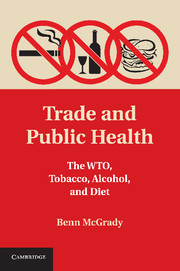Book contents
- Frontmatter
- Contents
- Preface
- Abbreviations
- 1 Intersections between Trade and Noncommunicable Disease
- 2 Normative Integration: Using Health Instruments in Interpretation of the WTO-Covered Agreements
- 3 Freedom to Use Taxes, Subsidies, and Restrictions on Marketing
- 4 Necessity and Regulatory Autonomy under the GATT
- 5 Product Regulation and Labeling Measures under the SPS and TBT Agreements
- 6 Reallocating Authority at the International Level: Delegation, Legalization, and Harmonization
- 7 Conclusion
- Glossary of Basic Trade Terms
- Bibliography
- Index
- References
1 - Intersections between Trade and Noncommunicable Disease
Published online by Cambridge University Press: 03 May 2011
- Frontmatter
- Contents
- Preface
- Abbreviations
- 1 Intersections between Trade and Noncommunicable Disease
- 2 Normative Integration: Using Health Instruments in Interpretation of the WTO-Covered Agreements
- 3 Freedom to Use Taxes, Subsidies, and Restrictions on Marketing
- 4 Necessity and Regulatory Autonomy under the GATT
- 5 Product Regulation and Labeling Measures under the SPS and TBT Agreements
- 6 Reallocating Authority at the International Level: Delegation, Legalization, and Harmonization
- 7 Conclusion
- Glossary of Basic Trade Terms
- Bibliography
- Index
- References
Summary
INTRODUCTION
The impact of the Marrakesh Agreement Establishing the World Trade Organization (WTO) (hereafter WTO Agreement) – and its linkage to other social issues has long been a subject of debate. One aspect of this debate is the linkage of trade and public health. In 2006 the World Health Assembly (WHA) passed a resolution stressing the need for greater coordination in the development of trade and health policies and recognizing the “demand for information on the possible implications of international trade and trade agreements for health and health policy at national, regional and global levels.” Following this, in 2007, the foreign ministers of Brazil, France, Indonesia, Norway, Senegal, South Africa, and Thailand issued the Oslo Ministerial Declaration. The declaration affirmed the interconnectedness of trade and health policies “in the formulation of all bilateral, regional and multilateral trade agreements.”
More recently, in early 2009, The Lancet, a leading public health journal, published a series of papers on trade and health. A number of commentators called for greater interaction between the public health and trade policy communities and for the public health community to play a greater role in trade policy making. This series of papers was reflective of the trade and health issues that have garnered attention since the conclusion of the Uruguay Round, such as those relating to intellectual property rights and access to medicines as well as trade in health services.
- Type
- Chapter
- Information
- Trade and Public HealthThe WTO, Tobacco, Alcohol, and Diet, pp. 1 - 33Publisher: Cambridge University PressPrint publication year: 2011

